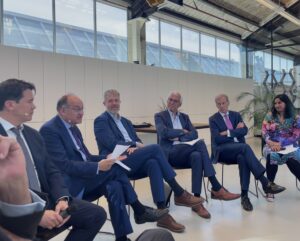
- The president of the Port Authority of Valencia (PAV) advocates promoting research with resources from the Port Authorities and collaborating with other smaller ports to fight together against climate change
- He also insists on the need to help the companies and clients of the port enclosures to accelerate the elimination of fossil fuels
- During his intervention, he defended collaboration with administrations and international organisations to establish uniform rules for all port activity
- The head of Valenciaport took part in the 5th WPCAP CEO Summit which brings together 12 of the most important ports in the world
València, May 18th, 2023.- “The decarbonisation of the ports is already an unstoppable and urgent process; and this is what we are demonstrating in Valenciaport and in the main ports of the world. With investments, with projects and with deeds”; this is how Joan Calabuig summarised the commitment of the Port Authority of Valencia (PAV) to the objectives in terms of decarbonisation and the fight against climate change established by the working groups of the World Ports Climate Action Program (WPCAP), an association of which 12 of the world’s main ports form part, at the summit held in Rotterdam.
The presidents and managers in environmental matters of the ports of global reference that form part of the WPCAP group expressed themselves in similar terms. “Better to act quickly than late”, “a decade ago we were talking about climate change as just another item on the agenda; for some years now it has been one of the first objectives of the ports: to decarbonise and help other ports and the companies that work with us to follow in our footsteps”, “we must be a tractor example to follow”. In these terms, the president of the Port of Rotterdam and host of the meeting, Allard Castelein, the president of the Port of Hamburg, Jens Meier, Santiago Milà, deputy general manager of the Port of Barcelona, and Eric Caris, commercial director of the Port of Los Angeles, expressed themselves in these terms.
The president of Valenciaport defended before his counterparts from Antwerp/Bruges, Hamburg, Le Havre, Long Beach/Los Angeles, Rotterdam and Vancouver the need to “act now” with specific actions in the decarbonisation of maritime transport, to support the rest of the smaller port enclosures in the fight and to join the companies in their hinterland in this process.
Calabuig took part in the panel on National and Regional Leaders together with the CEO of the Port of Rotterdam, Allard Castelein; the CEO of the Port of Antwerp/Bruges, Jacques Vandermeiren; the coordinator for Maritime Industry and Tourism of the Ministry of Economic Affairs and Climate Action of the German government, Dieter Janecek; and the director of WPCAP and the Port of Vancouver Port Authority, Ronan Chester.
The president of the Valencian port expressed “our full support and commitment to the WPCAP and its objectives” and explained that the commercial ports integrated in this programme “have a great impact on our respective areas of influence and on the decarbonisation of the sector, but we also have to help other ports and the companies in our hinterland in these processes”.
Along these lines, Joan Calabuig pointed out that “the PAV is technically supporting several Latin American ports in their sustainability strategies. We are an important actor for the competitiveness of our countries, but also for other actors to whom we have to lend our know-how and the necessary mechanisms so that they can carry out their processes of change”.
For us,” Calabuig pointed out, “the regulations and the roadmap are defined by the European Union. We are all committed to decarbonisation, but the new rules must not introduce artificial imbalances in the competitive scenario”. In this sense, the president of the PAV shared with his European counterparts his concern about the ‘Fit for 55’ legislative package on climate neutrality of the European Union which may divert traffic to other peripheral areas outside the European space. “The Spanish ports have collaborated to warn of this possibility, warning also that a possible diversion of ports of call or redefinition of maritime services by the shipping lines would not be effective in achieving the objective of reducing emissions”.
For this reason, he called for a common regulatory framework for maritime freight traffic activity. Calabuig underlined that “our ports form part of an international global sector, which makes it absolutely necessary to establish the greatest possible uniformity in the rules of our activity. The WPCAP must collaborate with the IMO to achieve this standardisation that we believe is necessary”.
During his speech, the head of the PAV highlighted the commitment of many countries to become large-scale producers of new alternative fuels. However, he warned that “we must be aware of the reality and at the current rate of production, in 2030 we will be very far from our objectives”.
The president of Valenciaport proposed working in three areas to make progress on these commitments and shorten the timeframe. “Firstly, we must continue to promote research and innovation from the port clusters. Secondly, the WPCAP ports must support other port areas of smaller dimensions or developing countries. And thirdly, we have to pull in the private sector. We must help small and medium-sized enterprises with more limited resources to implement decarbonisation strategies. We must not forget the fact that without their own zero emission projects, we will not be able to achieve our own.

